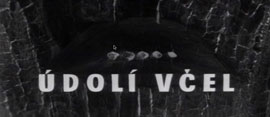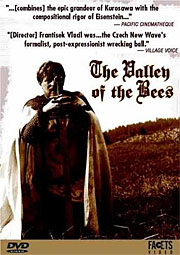 Údolí včel
Údolí včel
Czechoslovakia, 1967, black and white, 97 mins.
The year that Marketa Lazarová finally came to the end of its protracted five-year production schedule, František Vláčil wrote, shot and completed a second medieval film. This initially arose from an expedient plan to reuse the earlier film’s sets, though in the event these proved to be unusable following neglect and weather-damage. But before they discovered this, Vláčil and screenwriter Vladimir Körner had written The Valley of the Bees, which was then shot relatively (and uncharacteristically) rapidly in early 1967, even before Marketa had completed post-production.

But despite being shot back-to-back, it’s immediately apparent that while they both share resplendent black-and-white widescreen cinematography and a highly convincing recreation of the medieval era, they’re quite different in terms of style and tone. While Marketa Lazarová was chaotic and exhilarating, The Valley of the Bees is formal and restrained, its two protagonists bound by rigid codes of conduct that govern every action in both private and public spheres (in fact, precisely the kind of rules that Marketa so ardently sought as a means of escaping her own wretched existence). The crucial difference between Ondřej of Vlkov and his former mentor Armin von Heiden is that Armin is a true believer, while Ondřej was forced to join the Order of St Mary of Jerusalem as a by-product of his father’s overwhelming sense of guilt after nearly killing him for playing a practical joke during his wedding (to a woman far closer to Ondřej’s age than his own, an issue that will have serious repercussions later on).

As with Marketa, it’s a film of two distinct halves. In the first, Ondřej undergoes a process of extreme religious purification, renouncing all family connections, wordly goods and even physical contact with other human beings. A subplot in which a fellow member of the Order attempts to escape its stifling clutches is resolved quickly, murderously and all too visibly, pour encourager les autres. What complicates matters further for Ondřej is that Armin has taken a shine to him from the moment he joined the Order as a callow teenager, which means that he’s under constant observation – small wonder that Ondřej seems quite relaxed about the prospect of fasting in solitary confinement.
There’s more than a hint of repressed homosexuality in Armin’s attitude towards Ondřej, best depicted in the early scene where they lie naked on the shore, their arms locked, attempting to numb their lower bodies in the near-freezing waves. However, actually expressing this would have been unthinkable – not merely in terms of 1960s Czech cinema but Armin’s own stringent moral code. When he tells a blind woman (who bears a passing and possibly not coincidental resemblance to Marketa Lazarová) that if she touches him, she’ll pay with her hand, the line seems almost throwaway, but he clearly means every word. In his more reflective moments, he reminisces about his participation in what was presumably one of the Crusades, though his expectations of glory turned to ashes as his comrades were felled by the plague or their own moral failings, and he failed to reach Jerusalem.

In the second half, Ondřej successfully breaks free of Armin’s influence and returns home, only to discover that his father is long dead and that his long-buried feelings for his stepmother Lenora become hard to hold back. This is nowhere near as perversely Oedipal as I’ve made it sound, since they lack blood ties and are virtually the same age – but it’s inevitable from the start that their liaison will end tragically, exacerbated when Armin makes an eleventh-hour return from the dead. Counterintuitive casting works well here, with the dark, saturnine, faintly sinister Petr Čepek playing the supposedly more conventionally human Ondřej against Jan Kačer’s clean-cut, outwardly appealing Armin, whose inner fanaticism only emerges at times when it’s unavoidable (though his lack of human warmth is revealed in a somewhat over-literal scene early on, when the Commander of the Order shudders at the touch of his ice-cold hands).
Once I’d got over my initial disappointment that The Valley of the Bees wasn’t going to be Marketa Lazarová 2, its own considerable virtues became much clearer, particularly on a second viewing. Combining the ascetic rigour of a Bresson with the pictorial sense of a Brueghel, Vláčil poses his characters a series of impossible moral conundra, forcing them to choose between their own desires and the codes that regulate their behaviour but which also suppress their humanity. As before, he makes brilliant use of sound, especially in the recurring aural motif of the bees that dominated Ondřej’s childhood (he’s first shown gingerly probing a hive with his bare hands) – the bees, of course, form another society govern by strictly-imposed hierarchical rules. Although Zdeněk Liška’s score lacks his usual fireworks, it’s appropriate that his evocation of medieval plainchant is as stark as the images.

Seemingly more straightforward than Marketa Lazarová – it’s certainly much more easily graspable on a first viewing – The Valley of the Bees is ultimately just as complex, raising questions about the conflict between human nature and codified ideology that couldn’t help but strike a chord with its original audience. Indeed, after its low-key premiere during the Prague Spring of early 1968, the film ran into trouble in the wake of the Soviet invasion that August, on the grounds that its depiction of a man forced to join a fanatically puritan religious order against its will had a clear allegorical message. And Vláčil’s refusal to provide neat answers made his film all the more potent as a (potential) instrument of subversion.
- Director: František Vláčil
- Producer: Věra Kadlecová
- Screenplay: Vladimír Körner, František Vláčil
- Photography: František Uldrich
- Editor: Miroslav Hájek
- Design: Jindřich Goetz
- Sound: František Fabián
- Music: Zdeněk Liška
- Cast: Petr Čepek (Ondřej); Jan Kačer (Armin); Věra Galatíková (Lenora); Zdeněk Kryzánek (Lord of Vlkov)); Miroslav Macháček (monk); Josef Somr (Rotgier); Václav Kotva (farmer); Jana Hlaváčková (blind girl); František Kovářík (shepherd); Josef Kotapiš, Petr Sedlák (colliers); Antonín Pražák, Ludvík Volf (hunters); Ladislav Gzela (Jakub); Pavel Štěpánek (Markvart); Michal Kožuch (Blasius); Jana Hájková (young Lenora); Zdeněk Sedláček (young Ondřej); Miloš Willig (commander); František Husák (grey monk)

DVD Distribution: Facets (US), NTSC, no region code.
Picture: This is certainly the best of Facets’ three Vláčil DVDs by some distance, but it falls short of the standard set by Second Run with Marketa Lazarová. Although drawn from a surprisingly clean print (slightly cleaner than the source for the earlier film, in fact), the interlaced image is very soft, almost to the point where the opening credits look blurred. Some shots have very high contrast but, as with Marketa, this may well be characteristic of the original.
Sound: A marked improvement on Facets’ The White Dove, and broadly on a par with Marketa Lazarová, this respects the original mono recording and sounded fine to my ears, aside from some brief but pronounced dropouts at the reel changes.
Subtitles: As with the other Vláčil DVDs, the subtitles are yellow, burned into the image and slightly out of sync, appearing a second or two later than necessary. For the most part, this isn’t a problem, as spoken content is kept to a minimum, and two-way conversations are even rarer, though there are a couple of occasions when lines of dialogue are accompanied by the preceding subtitle. The translation is acceptable for the most part, though a number of typos betray a lack of quality control (“the holly walls of Jerusalem”).
Extras: There are no extras on the disc, but the 16-page booklet provides some helpful background, including statements by Vláčil and screenwriter Vladimir Körner, as well as an overview of Vláčil’s career by Susan Doll.
Links
- České filmové nebe (in Czech)
- Česko-Slovenská filmová databáze (in Czech)
- Internet Movie Database
- Reviews: Central Europe Review (Peter Hames); Flickhead (Nelhydrea Paupér); Movie Habit (John Adams); The Village Voice (Michael Atkinson)
- DVD available from: Amazon.com